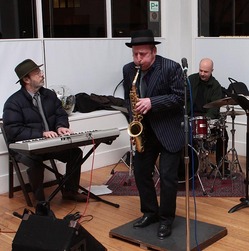The Master Musicians of Jajouka, a troupe from Morocco’s Rif Mountains, stretch anyone’s definition of “jazz.” They sure don’t make the cut according to alto saxophonist Lou Donaldson, who regaled the crowd attending his “Jazz Conversation” at the PDX Jazz Festival (Portland OR) with the opinion that he’s the only real “jazz” artist on the sched during the fest’s second weekend, dissing saxophonists Eric Dolphy, Ornette Coleman and Tom Scott, among others, as having “nothing to do with jazz” slighting Frank Morgan as a “phony” and Cannonball Adderley as “not all they said he was.”

Apologies to readers of Doug Ramsey’s Rifftides who expected immediate and complete  coverage of the Portland fest’s second weekend — I try to make amends below.I arrived after a protracted travel day (Alaska Airlines did what it could, but Newark Airport is a dull place to sit for six hours awaiting an electrical repair to tail flaps), my timing all off.
howardmandel.com
Subscribe by Email
Subscribe by RSS
All JBJ posts
